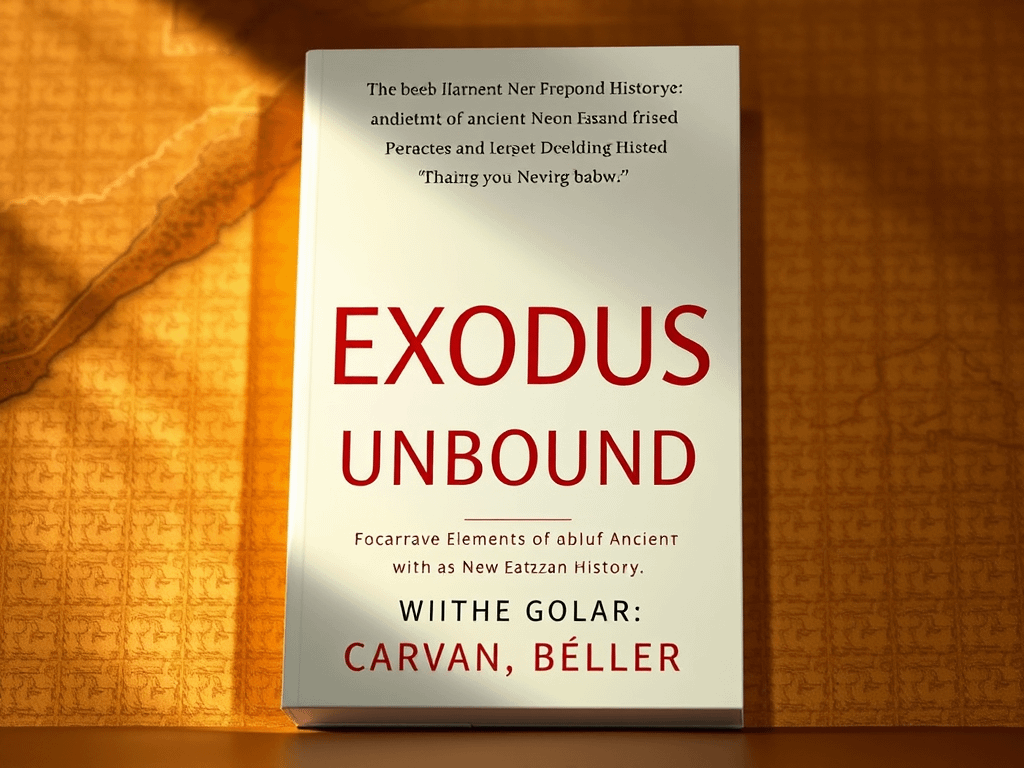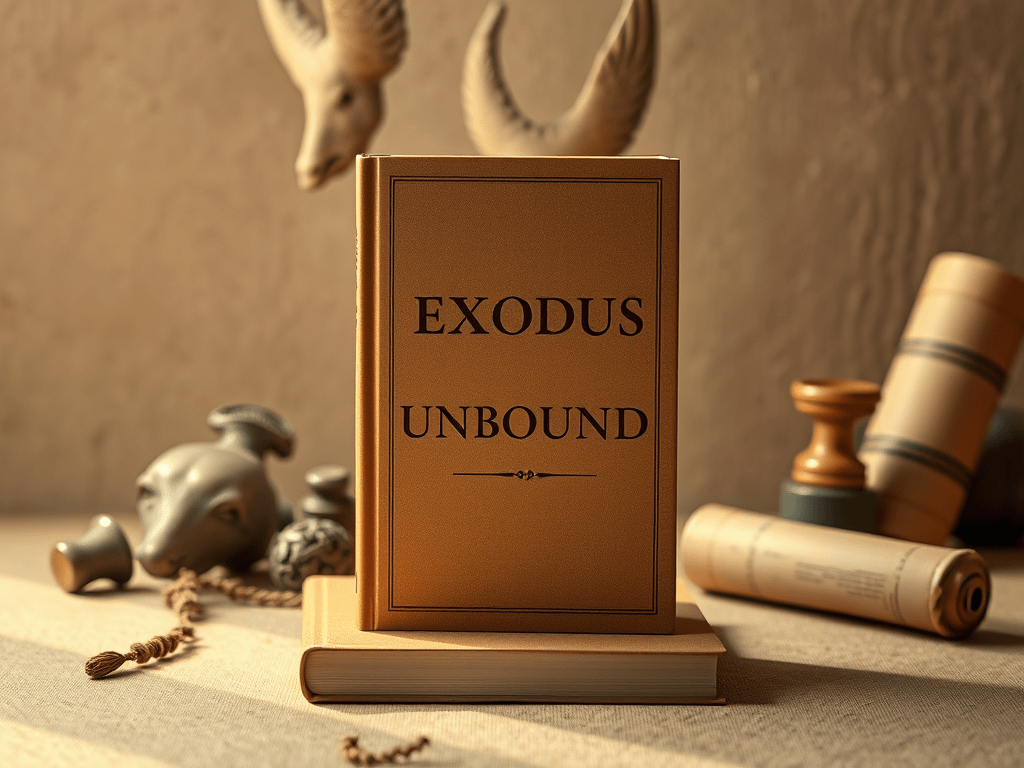Exodus Unbound: A Fresh Look at Biblical Miracles and Faith
Exodus Unbound: Have you ever wondered how historical narratives can reshape our understanding of ancient events?
“Exodus Unbound” challenges traditional interpretations of one of the most significant stories of the ancient world, prompting a reevaluation of what we know about the Israelites’ departure from Egypt.
This controversial work invites readers to reconsider long-held beliefs, sparking debates among historians, theologians, and archaeologists alike.
In this article, we will delve into the complexities presented in “Exodus Unbound,” examining the evidence, interpretations, and implications for modern scholarship.
The Genesis of “Exodus Unbound”
“Exodus Unbound” is a groundbreaking book that questions the conventional timeline and geographical setting of the biblical Exodus.
The author, an expert in ancient Near Eastern history, presents a bold thesis: the Exodus story, instead of being a myth or mere allegory, has historical foundations that are vastly different from traditional accounts.
The book argues that changes in geopolitical landscapes and socio-political dynamics in the ancient Near East necessitate a reexamination of this iconic narrative.
| Key Argument | Traditional Interpretation | Proposed Revision |
|---|---|---|
| Timing of the Exodus | 13th century BCE | Alternate century BCE |
| Location of Events | Sinai Peninsula | Alternate regional location |
| Historical Evidence | Limited archaeological support | New archaeological insights |
| Identity of Pharaoh | Ramesses II | Alternate Pharaohs considered |
By challenging established timelines and proposing alternative locations, “Exodus Unbound” provides a fresh perspective that is both intriguing and contentious.
The examination of archaeological findings and ancient texts forms the crux of the book’s hypothesis, encouraging scholars to reassess their methods and conclusions.

The Historical Context Behind the Exodus
Understanding the historical context of the Exodus requires a deep dive into the geopolitical and cultural environment of the ancient Near East.
During the proposed timeline, the region was a melting pot of emerging civilizations, each with its own unique influences on the development of nascent societies.
“Exodus Unbound” argues that the interactions between these civilizations played a crucial role in shaping the events that would later be immortalized in biblical texts.
The book suggests that the migration of the Israelites may correspond to broader patterns of movement and conflict in the region.
By analyzing both biblical accounts and extrabiblical sources, the author constructs a narrative that situates the Exodus within the broader tapestry of ancient world history.
This multidimensional approach seeks to dismantle the monolithic interpretations that have long dominated scholarly discourse.
Potential Repercussions for Biblical Scholarship
“Sometimes, new insights come from stepping outside the boundaries of accepted wisdom.” – Anonymously sourced
By proposing such revolutionary ideas, “Exodus Unbound” has significant implications for biblical scholarship.
It encourages historians to reconsider not only the details of the Exodus story but also the methods used in biblical interpretation.
The reliance on interdisciplinary approaches, combining archaeology, history, and textual analysis, opens the door to a more nuanced understanding of ancient narratives.
If accepted, these revisions could transform how religious communities perceive sacred texts, potentially altering theology and religious practice.
The book has sparked rigorous debates, highlighting the importance of critical examination and openness to new interpretations.
Such discussions underscore the dynamic nature of historical inquiry, where new evidence can lead to a reevaluation of deeply held beliefs.

Archaeological Evidence and Its Interpretation
Archaeology plays a pivotal role in validating or refuting historical narratives, and “Exodus Unbound” heavily relies on archaeological evidence to substantiate its claims.
However, interpreting archaeological findings is inherently complex, fraught with ambiguity and open to subjective interpretation.
The book meticulously analyzes artifacts, settlement patterns, and inscriptions to build its case for a revised understanding of the Exodus.
1- The discovery of settlement remains in alternate locations supports the proposed timeline.
2- Inscriptions with references to Semitic peoples challenge the traditional identification of the Israelites in Egypt.
3- Shifts in climate and trade routes during the proposed period may have influenced migration patterns.
4- Analysis of burial sites and their alignment with biblical descriptions offers new insights into ancient customs.
These elements collectively form a compelling argument that questions established archaeological consensus.
By integrating new findings with established data, “Exodus Unbound” provokes readers to look beyond traditional interpretations and consider the broader implications of archaeological evidence for historical narratives.
Linguistic and Textual Analysis
Language and texts are another critical component of “Exodus Unbound,” as the author examines both biblical and extrabiblical sources to substantiate claims.
Linguistic analysis reveals inconsistencies in traditional translations, offering potential alternative readings of key passages.
This section delves into the complexity of ancient languages, where subtle nuances can significantly alter meaning.
The interpretation of ancient scripts, particularly in how they have been handed down through generations, is an intricate process.
Variations in dialects, translations, and transcriptions can lead to vastly different conclusions. The author of “Exodus Unbound” employs linguistic expertise to challenge prevailing interpretations and propose a revised understanding of ancient narratives.
The Role of Oral Tradition in Historical Interpretation
Oral tradition has been a fundamental aspect of historical transmission in ancient societies, often serving as a supplement or even an alternative to written records.
“Exodus Unbound” emphasizes the importance of oral tradition in shaping the Exodus narrative, highlighting how stories passed down through generations can be both a reliable source of historical information and a canvas for embellishment or alteration.
By focusing on oral traditions, the book provides a perspective that recognizes the fluid nature of storytelling, where each retelling is potentially subject to changes that reflect contemporary values or knowledge.
This recognition is crucial for understanding how certain elements of the Exodus story might have evolved over time, thus informing the broader debate about its historical accuracy.

Cultural Impact and Modern Interpretation
The Exodus narrative holds considerable cultural significance, serving as a foundational story for many religious communities across the world.
“Exodus Unbound” challenges these foundational aspects, prompting discussions on how such revisions could affect religious traditions and modern beliefs.
The potential reinterpretation of the Exodus story requires both religious scholars and believers to engage with the historical foundations of their faith.
The book encourages modern communities to reflect on the meaning of Exodus in contemporary contexts, exploring its themes of liberation, resilience, and identity.
By reexamining historical evidence and narratives, “Exodus Unbound” fosters an environment of inquiry and dialogue that transcends religious divisions, uniting communities in a shared pursuit of understanding.
Debates and Criticisms Surrounding “Exodus Unbound”
As with any bold scholarly work, “Exodus Unbound” has not been without its critics. The book’s challenge to established narratives has sparked debates among scholars, with detractors questioning the validity of the evidence presented and the methodologies employed.
Critics argue that the book may overemphasize speculative interpretations at the expense of empirical data, cautioning against the risk of revisionism without conclusive proof.
Proponents of the book defend its thesis, highlighting its contribution to expanding the academic discourse and encouraging scholarly debate.
They argue that challenging established beliefs is a necessary part of scientific inquiry and is essential for advancing knowledge.
The ongoing discourse demonstrates the dynamic nature of academic exploration, where diverse perspectives contribute to a richer understanding of history.
Conclusion
“Exodus Unbound” represents a bold and contentious entry into the realm of historical and biblical scholarship, challenging readers to revisit longstanding narratives with a critical eye.
By emphasizing interdisciplinary approaches and encouraging debate, the book contributes to an evolving dialogue about the ancient world.
Whether one agrees with its conclusions or not, “Exodus Unbound” serves as a catalyst for inquiry and reflection, underscoring the importance of openness to new interpretations in the pursuit of historical truth.
FAQ – Common Questions
What is the central thesis of “Exodus Unbound”?
The thesis of “Exodus Unbound” suggests a revised timeline and geographical setting for the biblical Exodus, challenging traditional interpretations.
How does “Exodus Unbound” affect religious beliefs?
While it primarily addresses historical interpretations, “Exodus Unbound” may prompt religious scholars and followers to reconsider the historical foundations of their faith.
What methodologies does the author use?
The author employs interdisciplinary approaches, combining archaeology, linguistic analysis, and historical texts to substantiate claims.
Why is archaeology important for this narrative?
Archaeology provides physical evidence that can support or refute historical narratives, making it crucial for validating the claims in “Exodus Unbound.”
How do critics view “Exodus Unbound”?
Critics argue that the book may rely on speculative interpretations, cautioning against revisionism without conclusive evidence.
Conclusion
“Exodus Unbound” represents a bold and contentious entry into the realm of historical and biblical scholarship, challenging readers to revisit longstanding narratives with a critical eye.
By emphasizing interdisciplinary approaches and encouraging debate, the book contributes to an evolving dialogue about the ancient world.
Whether one agrees with its conclusions or not, “Exodus Unbound” serves as a catalyst for inquiry and reflection, underscoring the importance of openness to new interpretations in the pursuit of historical truth.







